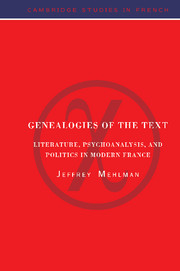Book contents
- Frontmatter
- Contents
- Acknowledgments
- 1 Introduction
- 2 Craniometry and criticism: notes on a Valéryan criss-cross
- 3 Literature and hospitality: Klossowski's Hamann
- 4 Literature and collaboration: Benoist-Méchin's return to Proust
- 5 “Pierre Menard, author of Don Quixote” again
- 6 Iphigenia 38: deconstruction, history, and the case of L'Arrêt de mort
- 7 Writing and deference: the politics of literary adulation
- 8 Perspectives: on Paul de Man and Le Soir
- 9 Prosopopeia revisited
- 10 The paranoid style in French prose: Lacan with Léon Bloy
- 11 The Holocaust comedies of “Emile Ajar”
- 12 Pour Sainte-Beuve: Maurice Blanchot, 10 March 1942
- 13 Flowers of evil: Paul Morand, the Collaboration, and literary history
- Appendix
- Notes
- Index
- Series list
12 - Pour Sainte-Beuve: Maurice Blanchot, 10 March 1942
Published online by Cambridge University Press: 19 January 2010
- Frontmatter
- Contents
- Acknowledgments
- 1 Introduction
- 2 Craniometry and criticism: notes on a Valéryan criss-cross
- 3 Literature and hospitality: Klossowski's Hamann
- 4 Literature and collaboration: Benoist-Méchin's return to Proust
- 5 “Pierre Menard, author of Don Quixote” again
- 6 Iphigenia 38: deconstruction, history, and the case of L'Arrêt de mort
- 7 Writing and deference: the politics of literary adulation
- 8 Perspectives: on Paul de Man and Le Soir
- 9 Prosopopeia revisited
- 10 The paranoid style in French prose: Lacan with Léon Bloy
- 11 The Holocaust comedies of “Emile Ajar”
- 12 Pour Sainte-Beuve: Maurice Blanchot, 10 March 1942
- 13 Flowers of evil: Paul Morand, the Collaboration, and literary history
- Appendix
- Notes
- Index
- Series list
Summary
In response to a manuscript meditating his contributions to the 1930s fascist journal Combat and the distance he would have had to traverse from the margins of Action Française to the “passivity beyond all passivity” of his later excursus on literature, Maurice Blanchot, in a letter of 1979, zeroed in on what he called an “exemplary” error in the text I had sent him. It turned on a footnote that quoted first Claude Roy on Blanchot's transition from “Maurrassian nationalism” to the Resistance, then a passage from Léautaud's Journal in which Drieu la Rochelle – in May 1942 – is heard on the subject of the editorial assistance at the Nouvelle Revue française he has received from Blanchot during a period in which he was overworked. Blanchot, in his letter to me, had eyes only for the Leautaud entry and insisted on setting the record straight. He recounted how he had in fact turned down an offer from Drieu to assume “free” editorship of the journal (with Drieu himself retaining nominal authority as a safeguard). Blanchot, in consultation with Paulhan, first stalled, then came up with a list of “great writers” for a new editorial committee. Given their anti-Nazi sympathies, Drieu declined. Thus Blanchot in his letter of 26 November 1979.
The most striking aspect of the letter was less the correction of Léautaud's second-hand account, about which I myself had expressed doubts, than its marginality to the principal subject of my essay.
- Type
- Chapter
- Information
- Genealogies of the TextLiterature, Psychoanalysis, and Politics in Modern France, pp. 174 - 194Publisher: Cambridge University PressPrint publication year: 1995

